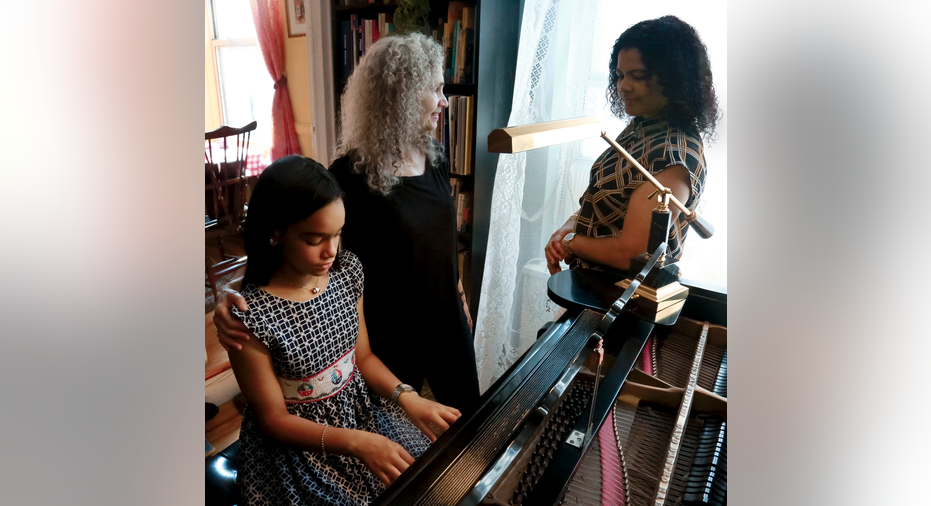Some things to know about music lessons for children

NEW YORK – Andolina Collado didn't know where to start when her young daughter asked for violin lessons. An immigrant from the Dominican Republican who works as a home health aide, she asked everyone she saw carrying an instrument in her Manhattan neighborhood if they knew of affordable lessons. Finally, one man pointed her to a church where Whin Music Project offers sliding scale tuition based on income.
Her daughter Anmy thrived in violin and soon wanted to learn piano. Whin teachers pointed her to the MusicLink Foundation, which pairs motivated students from low-income families around the country with music teachers willing to give lessons at a discount. At age eight, Anmy wrote to MusicLink to ask if somebody who spoke Spanish could contact her mother. Julie Wegener, New York City coordinator for MusicLink, was so moved she decided on the spot to teach Anmy herself.
Collado isn't the only parent who has watched instrument-toting strangers and wondered how to enter that world.
Private lessons are beyond the reach of many families and even music programs at public schools can come at a price. Students in elementary, middle and high school can expect to pay at least $300 in instrument rental or related costs, according to the "Backpack Index," an annual study of the cost of school supplies and fees conducted by Huntington Bank and the organization Communities in Schools.
Even for families with means, there are tricky questions. Who wants to invest several hundred dollars in a guitar that might end up in the closet? But then how do you know if you have a Mozart in the family?
Before plunging into music lessons, it helps to explore the landscape.
HAVE REALISTIC EXPECTATIONS
It's extremely unlikely your child is the next Yo-Yo Ma, but that's no reason not to put him in lessons. Your child's first piano class could be the first step to a scholarship at Julliard or the start of a lifelong hobby. Ask yourself if you're ok with either possibility because chances are the going will get tough after the novelty wears off.
Go in for the long-haul. Anthony Mazzochhi, associate director of the John J. Cali School of Music at Montclair State University, suggests giving it a go for two years or so before contemplating quitting. He suggests prioritizing daily practice like math homework. With the big picture in mind, a few struggles over practice won't seem like signs your investment is going down the drain.
INVOLVE YOUR CHILD IN THE DECISION
It helps if you don't just drop an unsuspecting 6-year-old in piano lessons. Let your child explore different instruments first. Try the library or local park for free concerts and sing-a-longs. Mazzochhi, who runs the website www.musicparentsguide.com , suggests watching YouTube videos of master performances. He advises searching for music stores that offer "petting sessions" for children to hold and try out instruments.
TAKE THE TIME TO FIND A GOOD TEACHER
A good place to start is the Music Teacher National Association, which has a "Find-A-Teacher" search function and tips on what to look for, says Sue Wege, director of coordinators for MusicLink. Try to get a trial lesson and interview. The MTNA site offers a list of questions to ask, including whether the teacher offers performance opportunities that can be important for motivating children.
Look for teachers who are plugged into the music scene and provide fun opportunities for children. In addition to recitals at her studio, Wegener takes her students to play pianos that the group "Sing for Hope" places outdoors throughout New York City in June. She sent Anmy's name to Piano Explorer Magazine, which prints the names of kids who achieve more than 100 days of practice. Anmy long surpassed that goal and is now close to 600. In February, she performed at the inauguration of New York State Sen. Marisol Alcantara.
RENT OR BUY, USED OR NEW?
There are pitfalls when it comes buying used or cheap instruments. A good rule of thumb is to consult with your child's music teacher before turning to Craig's List.
George Shelby, a Los Angeles musician who tours with Phil Collins and created the Yamaha-sponsored website www.musicalinstrumentchoices.com , recommends sticking with reputable music stores for rentals and used instruments. While that might be pricier than going online, the instrument will come with a quality guarantee.
It is possible to find quality instruments on sites like eBay but Shelby urges buyers to bring a technician to check it out.
Many dealers also offer rent-to-buy options. Let your child know he gets to keep the instrument if he practices every day.
RESEARCH, REACH OUT, SPEAK UP
On the fence about private lessons? There's no rush. Find out how good your school's program is. Ask how often classes meet. Check out The National Association of Music Merchant's website for a list of school districts with the best music programs. It might be enough to supplement that program with lessons every other week. Group lessons are also a more affordable option, or seeking a graduate student who teaches at a discount.
PLAN FOR THE COSTS OF A SCHOOL MUSIC PROGRAM
Because of fees, music is one of the three areas — along with sports and field trips — where low-income students get left out, according to Dale Erquiaga, president and CEO of Communities in Schools. He urges families to ask school officials about fee waivers or seek out a community coordinator for help. Reach out to parents of older children about hand-me-down instruments, unexpected costs and money-saving tips.
"Some people are embarrassed to ask," said Collado. "I'm not embarrassed."



















